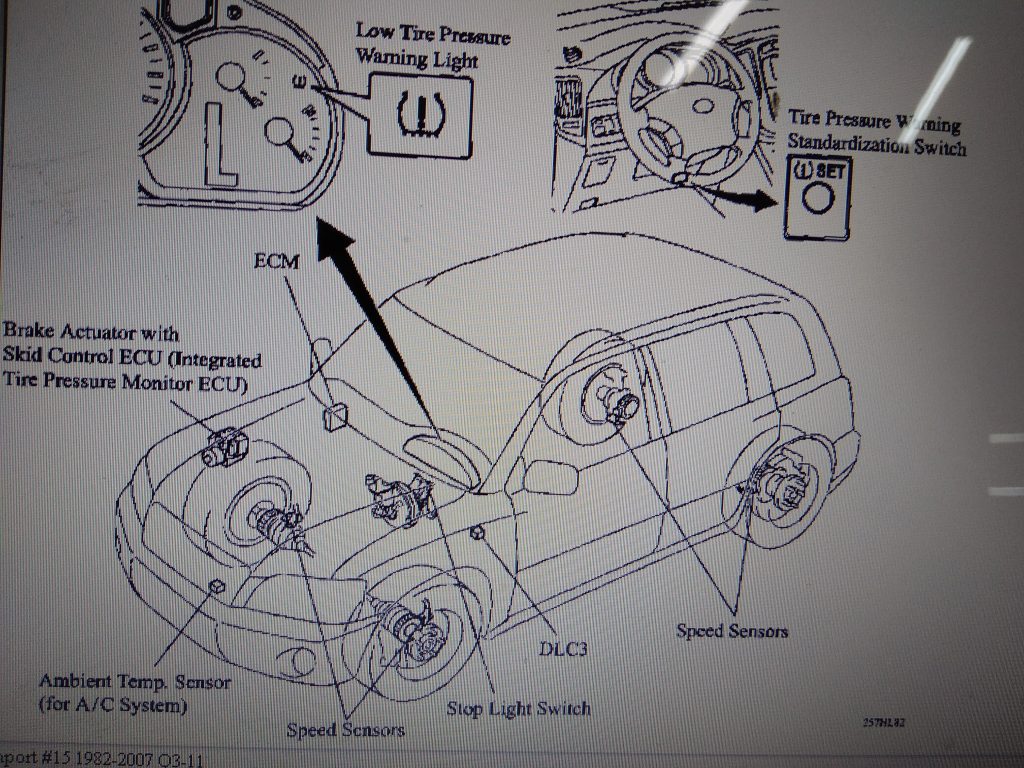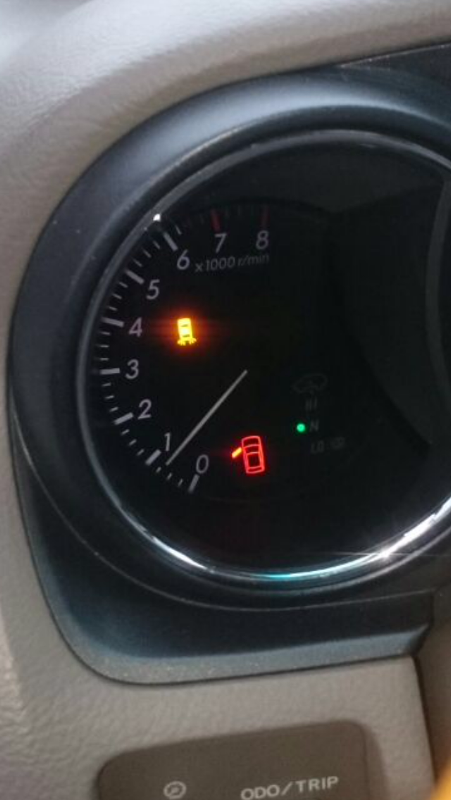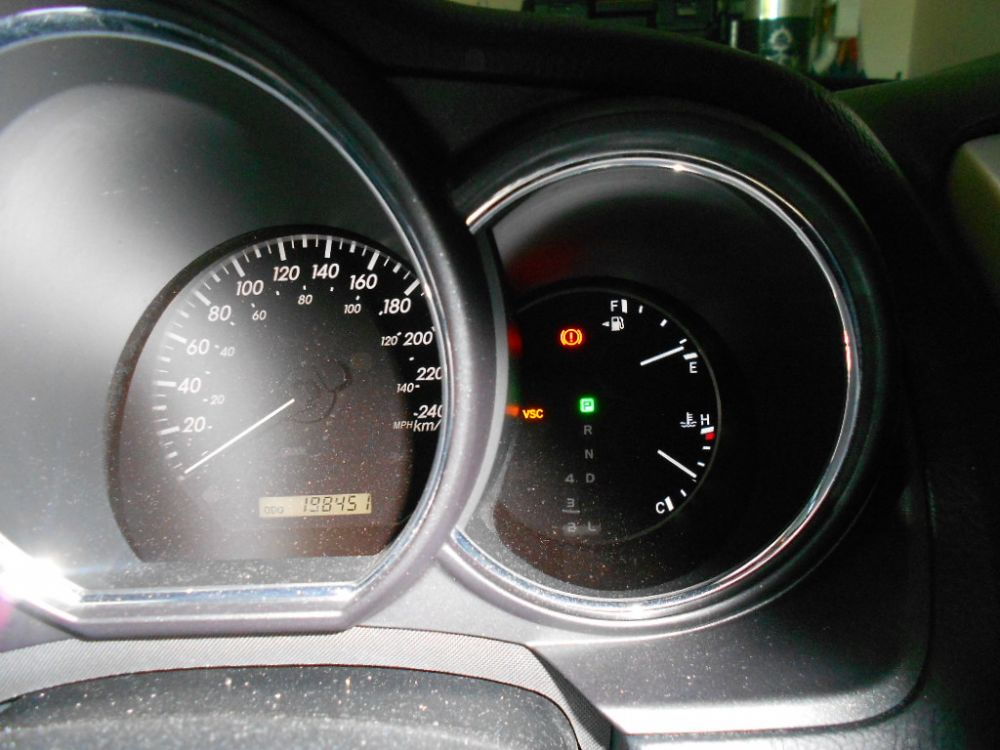by erwincsalarda
Procedure using another Properly Formatted Scan Tool

Note: Certain models can store two sets of sensor IDs. A switch, labeled Main/2nd , can be found inside the right side of the glove box. Make sure the switch is set to Main prior to starting the reset procedure. If the reset procedure fails, try setting the switch to 2nd and repeat the reset procedure.
If you see an error on the screen while performing an OBDII Relearn, check to make sure that the vehicle is in the ON position (not ACC). Also make sure all the connections are secure.
Errors E1 and E2 – Reading Communication Errors
Make sure vehicle is ON and not ACC Check for secure connection.
Errors E3 and E6 -Writing Communication Errors
Make sure vehicle is ON and not ACC Check for secure connection.
Error E4 – Wrong Set Error
Many Lexus vehicles can store more than one set of TPMS ID’s in ECU. Toggle the vehicles selected set to the MAIN set. Then retry OBDII Relearn.
Then retry OBDII Relearn.
Error E5 – Spare Tire Error
If you receive this error, and you did not upload a sensor ID for the spare, then this vehicle requires a spare. If you did upload a spare, but you received this error, then the vehicle does not store the ID in the ECU for the spare tire.
Easy to follow procedure on how to reset/relearn the TPMS service maintenance indicator warning light on Lexus RX350 2007 and 2015.
A TPMS Tool and OBD II Module, or another properly formatted TPMS scan tool, are required to perform this procedure.
1. Inflate all tires to the pressure listed on the vehicle placard.
2. Select OBD II from your Tool’s menu.
3. Starting with the LF tire, use your Tool to scan each sensor in the following order: LF, RF, RR, LR (and full size spare if equipped).
4. After all sensor IDs have been read, turn ignition to the ON position with the engine OFF (not the ACC position).
5. Connect the OBD II Connector to the Tool then to the vehicle’s OBD II port. Make sure your connection is secure and the green light is on.
6. Select UPLOAD CAR IDS, from the Tool’s menu, and upload the sensor IDs.
7. When RELEARN COMPLETE / IDs UPLOADED TO CAR is displayed, the ID’s have been successfully uploaded.
8. To verify the baseline tire pressures are correct, set the parking brake, then hold down the PRESSURE WARNING RESET SWITCH (located near the driver’s side knee bolster or in the glove box) until the TPMS telltale blinks 3 times. If the vehicle is not equipped with this RESET SWITCH, proceed to step 9.
9. With the ignition still in the ON position, re-scan each sensor.
10. Drive the vehicle above 25 MPH, for at least 10 minutes, and monitor the low tire pressure monitor to ensure it does not blink.
1. Inflate all tires to the pressure listed on the vehicle placard.
Inflate all tires to the pressure listed on the vehicle placard.
2. Apply parking brake and turn ignition to ON position with the engine OFF (not the ACC position).
3. Hold down pressure warning reset switch (located under the steering wheel or in glove box) until the TPMS telltale light blinks three (3) times.
4. It will take several minutes for the ECU to receive the signals from the sensors and complete initialization.
Note: Many Toyota/Lexus SUV’s and Minivans have a Main/2nd Button to store two sets of sensor IDs. (when using summer and winter tires/wheels). When the Button is not pressed, the vehicle monitors the Main ID’s on the vehicle. When the Button is pressed, the vehicle can monitor a 2nd (set of) ID’s. If Button is pressed, and no ID’s are stored under the 2nd position, the TPMS MIL will illuminate, so ensure you are writing the sensor IDs to the correct position.
If you see an error on the screen while performing an OBD II Relearn, check to make sure that the vehicle is in the ON position (not ACC). Also make sure all the connections are secure.
Also make sure all the connections are secure.
Errors E1 and E2 – Reading Communication Errors
Make sure vehicle is ON and not ACC Check for secure connection.
Errors E3 and E6 – Writing Communication Errors
Make sure vehicle is ON and not ACC Check for secure connection.
Error E4 – Wrong Set Error
Many Lexus vehicles can store more than one set of TPMS ID’s in ECU. Toggle the vehicles selected set to the MAIN set. Then retry OBD II Relearn.
Error E5 – Spare Tire Error
If you receive this error, and you did not upload a sensor ID for the spare, then this vehicle requires a spare. If you did upload a spare, but you received this error, then the vehicle does not store the ID in the ECU for the spare.
If you receive E1, E2, E3, or E4 on a Toyota/Lexus vehicle, after verifying a good connection, the vehicle may be stuck in a loop. This happens when the “SET” button is pressed after introducing new sensors to the vehicle. After step 5. (above), select UNLOCK ECU from you Tool’s menu. After successfully unlocking the ECU, perform the OBD II relearn starting with step 2. (above).
After step 5. (above), select UNLOCK ECU from you Tool’s menu. After successfully unlocking the ECU, perform the OBD II relearn starting with step 2. (above).
The first-generation RX 300, fitted with a 3.0-liter V6 engine, began sales in 1998. The Japanese market Toyota Harrier released in 1997 also offered a 2.2-liter inline-four, later uprated to 2.4-liters.
The second-generation RX 300 (3.0-liter V6) and RX 330 (3.3-liter V6) models went on sale in 2003, with both variants supplanted by the more powerful RX 350 (3.5-liter V6) in 2006. Like the previous series, a 2.4-liter inline-four engine was sold alongside the 3.0-liter V6 in the Japanese market Toyota Harrier. In 2005, a hybridized gasoline-electric version of the 3.3-liter second-generation model was made available as the RX 400h in export markets and as the Harrier Hybrid in Japan.
For the third iteration released in 2009, both RX 350 (3.5-liter V6) and RX 450h (3. 5-liter V6 hybrid) models were initially offered, with an entry-level RX 270 (2.7-liter inline-four) offered by Lexus in some Asian markets, including in Japan, since 2010. Since the release of the third generation, Japanese sales have occurred under the Lexus RX name as opposed to Toyota Harrier as had been the case previously. (Source Wiki)
5-liter V6 hybrid) models were initially offered, with an entry-level RX 270 (2.7-liter inline-four) offered by Lexus in some Asian markets, including in Japan, since 2010. Since the release of the third generation, Japanese sales have occurred under the Lexus RX name as opposed to Toyota Harrier as had been the case previously. (Source Wiki)
Tags: Lexus, Relearn, Reset, RX350, tpms
You are the proud owner of a recent car, the joy of tactile gadgets, integrated technology should bring you the ease and comfort of using your Lexus RX, which is important, however, that says technology talks about electricity, and, like we all, unfortunately, know sometimes the problem is fix. Today we will look at the tire pressure sensor and exactly how to reset the tire pressure sensor on the Lexus RX so that this indicator never appears on the dashboard again. To do this, we will divide our content into two parts: first we will focus on the general case when the tire pressure indicator appears and the method to follow, and then on the case of the tire indicator that remains on despite the tires being inflated. So, how to reset this tire sensor on Lexus RX.
So, how to reset this tire sensor on Lexus RX.
First, we will focus on the general approach to reset a tire sensor on a Lexus RX which, if it lights up, here are the basic simple steps:
 on the Lexus RX. The indicator light should have gone out or gone out after a few seconds. . In case this is not the case, we recommend that you go through the next section.
on the Lexus RX. The indicator light should have gone out or gone out after a few seconds. . In case this is not the case, we recommend that you go through the next section. Now that you have tried the normal method of removing the tire pressure sensor on the Lexus RX, and it didn't work, we'll move on to the second alternative, which is to have the tires on my Lexus RX well inflated and I still want that light to go away. Most likely, this means that you have Faulty tire pressure sensor. This will require to reset the value on your car's dashboard. However, be careful not to do this while driving as pressure fluctuations will affect your pressure sensors. Generally speaking, you need to go through the car configurations, then you should find the option to diagnose inflation or "deflation detection", once on this tab, you should hold the select button or reset button according to the year of your Lexus. RX until you see a message on the car console confirming that the reset has been taken into account (this usually takes a few seconds). You can now turn off the ignition and restart your Lexus RX to see if the tire pressure light has gone out.
RX until you see a message on the car console confirming that the reset has been taken into account (this usually takes a few seconds). You can now turn off the ignition and restart your Lexus RX to see if the tire pressure light has gone out.
If, despite your reset, the tire pressure indicator on your Lexus RX does not turn off, then the wisest solution is to go to the workshop, rather In total, it is tire pressure sensor on the valve that is faulty or faulty on your Lexus RX . Keep in mind that in general the unit price is around 120 euros. Another option that some people prefer to use because the problems may recur in some series is to disable the sensors with your carrier and diagnose your vehicle. However, this procedure is not recommended as it may result in improper handling and malfunction of your Lexus RX. Now you have all the keys in your hands to know how to reset the tire pressure sensor on the Lexus RX.